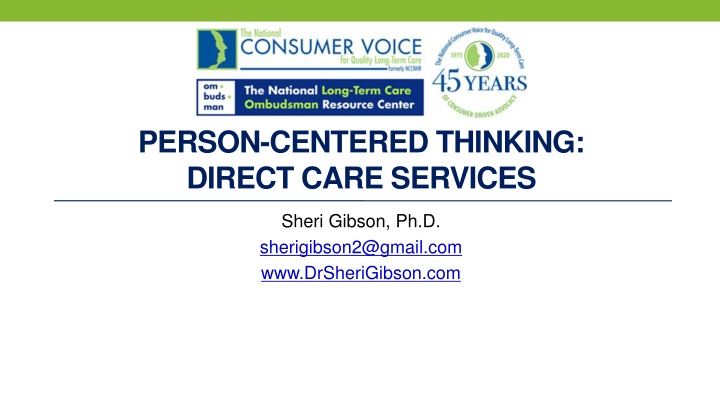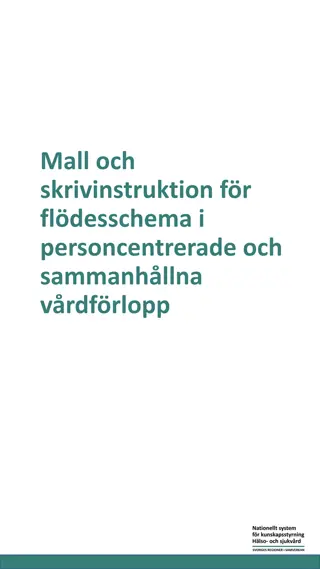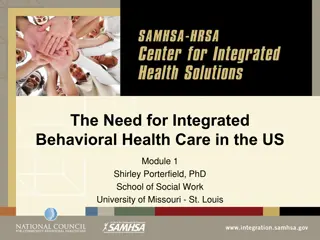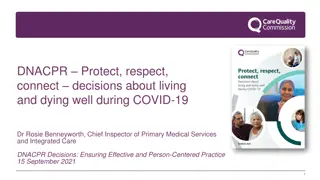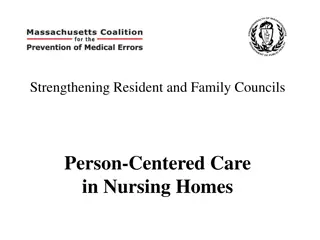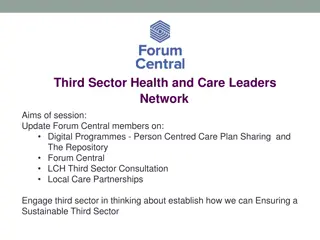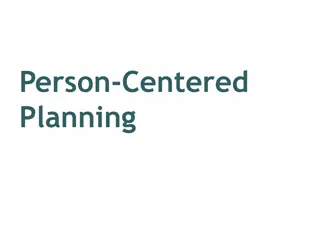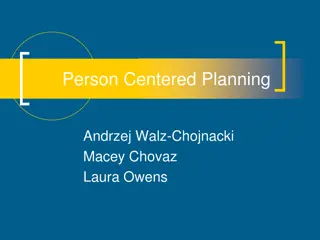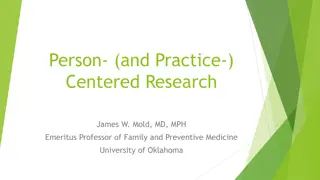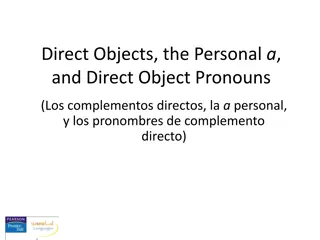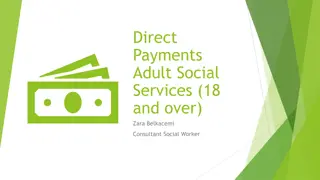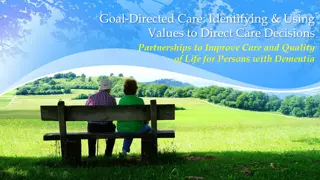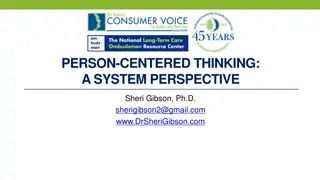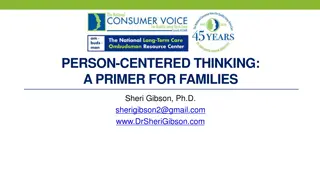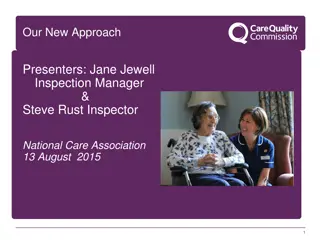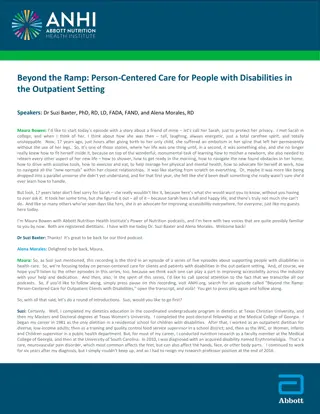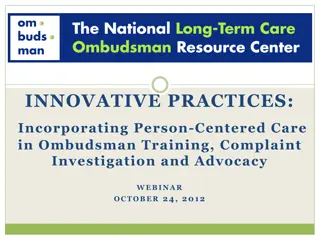Person-Centered Thinking in Direct Care Services
Providing Person-Centered Care is essential, especially during challenging times like COVID-19. This training focuses on understanding residents' needs, using behavioral and nonverbal indicators to improve care quality, and embracing a strength-based approach. Learn about Person-Centered Thinking, Carl Rogers' philosophy, and how to create a culture of learning and partnership. Discover the importance of honoring individuals' choices, promoting their control over their lives, and supporting them effectively within their communities.
Download Presentation

Please find below an Image/Link to download the presentation.
The content on the website is provided AS IS for your information and personal use only. It may not be sold, licensed, or shared on other websites without obtaining consent from the author.If you encounter any issues during the download, it is possible that the publisher has removed the file from their server.
You are allowed to download the files provided on this website for personal or commercial use, subject to the condition that they are used lawfully. All files are the property of their respective owners.
The content on the website is provided AS IS for your information and personal use only. It may not be sold, licensed, or shared on other websites without obtaining consent from the author.
E N D
Presentation Transcript
PERSON-CENTERED THINKING: DIRECT CARE SERVICES Sheri Gibson, Ph.D. sherigibson2@gmail.com www.DrSheriGibson.com
Intent of this Training: Providing Person-Centered Care Getting back to the basics Person-Centered thinking during a time of COVID-19 Tools to enhance your knowledge of resident s needs Behavioral and nonverbal indicators to raise awareness of what s working or what s not working
Carl Rogers Creator of Person-Centered therapy -Empathy at the core of therapeutic change -Clients are viewed through the lens of potential -Therapist exhibits positive, non-judgmental regard
What is Person-Centered Thinking? Definition- supporting versus dictating or fixing Strength base approach and build off strengths of the person Knowing the personal story of the people we serve Build a culture of learning, partnership and accountability An approach used to discover meaningful information regarding a person which is later used to create a person-centered plan of supports. Aims to promote the individual choice, direction, and control of their life and supports they receive. Helps to ensure individuals are allowed positive control over their desired life, are recognized for their contributions to their community of choice, and are supported through paid and natural supports within their community.
Creating a System and Culture of Person-Centered Care How are you doing within your organization? Language- reframe Perspective- of knowing people and honoring what is important to them while balancing what is important for them. Listen to how they want to live Support people in making use of community resources to have the life they want to live. Provide the support to assist people with making these things happen.
Five Foundational Beliefs 1. Important questions: Who is this person and what is important to them? 2. Person-centeredness aims to change common patterns of community life. 3. Person-centeredness fundamentally challenges practices that separate people and perpetuate controlling relationships. 4. Honest person-centered planning can only come from respect for the dignity and completeness of the whole person. 5. Assisting people to define and pursue a desirable future tests the person s clarity, commitment and courage.
Quality of Life and Self-Determination What does quality of life mean to the person? What does self determination mean to the person? Autonomy Dignity of risk informed choice and importance of documentation All of which are germane to long term care communities.
Important to and for Important To: Comfort Happiness Contentment Fulfillment Satisfaction Important For: Health and Safety Being a valued member of the community
Relationship Maps Sorting out who to talk to and who to listen to. Questions to ask of people who can tell you about the person: What do you like most about him/her? What do you admire about him/her? When is the last time you had fun together? What do the answers reveal? Does they reflect a personal or a working relationship with the individual? Be persistent in asking Like, Admire, and Fun Listen for the personal connection
Working and Not-Working tool Consider what s working and not working from different perspectives The perspective of the person with whom you are working. Also the perspectives of staff, family, or key stakeholder. Looking at a particular issue or circumstance. Core principles of negotiation: Person feels listened to. Start with common ground (what can everyone agree on?) Be unconditionally constructive
The Doughnut Our core responsibility What is important to do, as instructed Judgment and creativity What is tried to see if it works Beyond the boundary Not our responsibility Carrie s story
Four plus 1 What have we tried? What have we learned? What are we pleased about? What are we concerned about? Where do we go next?
Learning Log Date What did the person do? Who was there? What did you learn about what worked well? What did you learn about what didn t work well? Beverly s story
Listen, Listen, Listen Relationship is critical in long term care communities; What is being said to you that indicates success or needing a different approach? Nonverbal communication makes of 85% of all communication. Embrace the philosophy of being with people rather than doing to people.
From the Mud, grows the Lotus Adversity allows opportunity for growth and creativity; Person-Centered Thinking is a Strength-Based philosophy of being with people, not doing to people; Person-Centered Thinking is best modeled by YOU to create systemic change that reverberates across all levels of care and, ultimately, affects residents, and families.
Person-Centered Care Resources NORC Person-centered care - https://ltcombudsman.org/issues/person-centered-care Trauma-informed care https://ltcombudsman.org/issues/trauma-informed-care Consumer Voice Resident-Directed Care/Culture Change https://theconsumervoice.org/issues/for- advocates/resident-directed-care My Personal Directions for Quality Living - Blank Form & Sample A tool from Consumer Voice, with edits by SAGE, for individuals to share what matters to them for person-centered care. Information for LTC consumers - https://theconsumervoice.org/issues/recipients Information for Family Members - https://theconsumervoice.org/issues/family
Resources National Long-Term Care Ombudsman Resource Center (NORC) www.ltcombudsman.org Coronavirus Prevention in Long-Term Care Facilities: Information for Ombudsman Programs https://ltcombudsman.org/omb_support/COVID-19 National Consumer Voice for Quality Long-Term Care (Consumer Voice) www.theconsumervoice.org Coronavirus in Long-Term Care Facilities: Information for Advocates https://theconsumervoice.org/issues/other-issues-and-resources/covid-19 Coronavirus in Long-Term Care Facilities: Information for Residents and Families https://theconsumervoice.org/issues/other-issues-and-resources/covid-19/residents-families
Connect with us: www.ltcombudsman.org ombudcenter@theconsumervoice.org cid:image003.jpg@01CFB310.A36779F0 The National LTC Ombudsman Resource Center cid:image004.jpg@01CFB310.A36779F0 @LTCombudcenter Get our app! Search for "LTC Ombudsman Resource Center" in the Apple Store or Google Play This project was supported, in part, by grant number 90OMRC0001-01-00, from the U.S. Administration for Community Living, Department of Health and Human Services, Washington, D.C. 20201. Grantees undertaking projects under government sponsorship are encouraged to express freely their findings and conclusions. Points of view or opinions do not, therefore, necessarily represent official Administration for Community Living policy.
